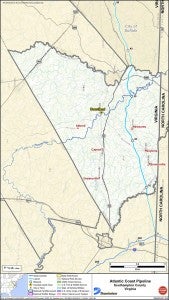Proposed pipeline to go through Southampton County
Published 10:03 am Wednesday, September 3, 2014
Richmond—With the news of a proposed natural gas pipeline going through Southampton County, naturally there are questions such as why, who benefits, how much would it cost, and what about the environment, to name a few concerns.
On Tuesday morning, four large energy companies announced they are working to build and own the Atlantic Coast Pipeline, which would provide natural gas to customers in Virginia and North Carolina. The companies are Dominion, Duke Energy, Piedmont Natural Gas and AGL Resources.
According to a press released issued by Dominion, the pipeline would tap into the growing production of natural gas in the Marcellus and Utica shale basins of West Virginia, Pennsylvania and Ohio. Ranging in cost from $4.5 billion to $5 billion, the 55-mile pipeline would come from Harrison County, West Virginia, would go southeast through Virginia with an extension to Chesapeake and south to Robeson County in central North Carolina. Locally, the pipeline would be in the southern part of Southampton County, staying south of Route 58, but crossing Route 258 as it goes into Suffolk.
Answering other questions Tuesday afternoon about the project was Jim Norvelle, director of communications for Dominion Energy, the natural gas subsidiary of Dominion Resources.
Tracy Agnew, news editor with The Suffolk News-Herald, shared with The Tidewater News on early Tuesday evening that Robert Duvall, vice president of operations for Virginia Natural Gas, said there will be no customers hooked to this pipeline. The gas will make it to its destinations in Chesapeake and Robeson County, and then be distributed from there.
Asked for confirmation from Norvelle, he replied via email, “This is a natural gas transmission pipeline that operates at high pressure. A distribution company such as VNG takes the gas, reduces the pressure and sends it out on its distribution system to residential or commercial customers. That’s the reason that you just can’t hook up to the line.”
To The Tidewater News, he also explained there are three “drivers” or factors to the project.
“First, electrical utilities needing cleaner sources of fuel to generate electricity,” he said. “That would include Dominion Virginia Power, and Duke, which is looking to close coal-power stations. Dominion Virginia will close the Chesapeake and Yorktown power stations, which has already been announced. The Brunswick station would replace those two.”
He added that it would not be economically feasible to maintain those sites with the environmental controls required by federal regulations.
“We think all of Virginia will benefit from cleaner air,” Norvelle said. “Dominion will still have a responsibility to provide electricity 24 hours a day.”
The second driver is that local natural gas companies such as Virginia Natural Gas “are looking for additional supplies for its customers.” He referenced AGL Resources, the parent firm of Virginia Natural Gas, another partner, and Piedmont Natural Gas for the Charlotte area. “Those companies are looking for reliable and affordable supplies.
“Third, those factories that need natural gas looking to grow — the economic development part of the project,” Norvelle said. “That’s not as far along as the other two factors.”
Norvelle said that of the 107 tracts along the proposed study corridor in Southampton, 76 percent gave their OK, which he called “a barometer of acceptance. The others we just haven’t heard from.”
Meanwhile, the Federal Energy Regulatory Commission will decide about building the pipeline.
“We’ll pre-file with FERC this fall. A date has not yet determined. Then make applications next summer,” he said. “We anticipate FERC to take a year to issue findings and make a recommendation, that would be in 2016.”
Norvelle also said that if everything’s approved, construction would start that year and take two years, finishing in late 2018.
Who would build the pipeline has not yet been determined, he added.
“The FERC has to do its study according to the National Environmental Policy Act and will address all pertinent environmental issues, and certainly we’ll address those,” Norvelle said. “That’s the most serious thing we have to look at.”
Dominion has scheduled informal open houses in affected localities. In this area, the session will be on Thursday, Sept. 25 in the Regional Workforce Development Center at Paul D. Camp Community College, 100 N. College Drive, Franklin. The open house will be in two parts; from 5 to 6:30 p.m., landowners within the proposed study corridor; from 6:30 to 8 p.m., landowners and the public.
Mike Johnson, county administrator, said he was familiar with the project, but so far didn’t know anymore than what was issued in the press release. He added that the Board of Supervisors will be briefed during its meeting on Monday, Sept. 22, which begins at 7 p.m.






